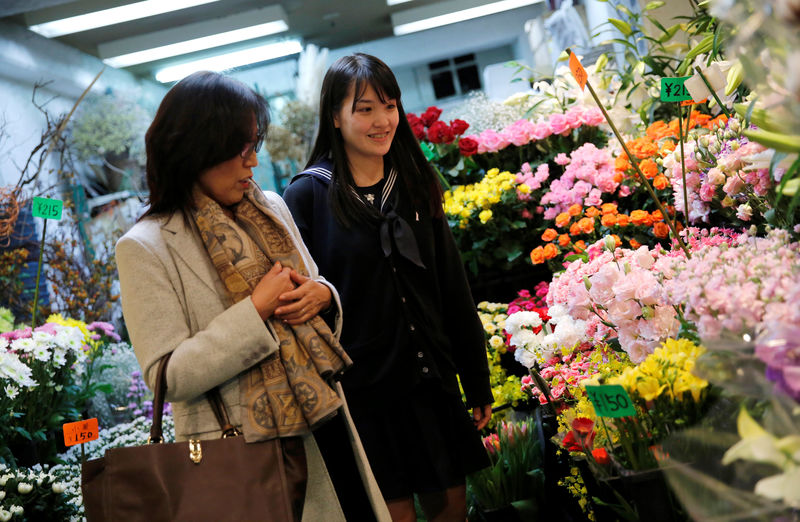By Minami Funakoshi
TOKYO (Reuters) - Japan's millennials have grown up in an economy that never seems to grow.
Accustomed to stagnant wages, jobs without benefits and a debt-burdened government, they came of age during the global financial crisis and the 2011 tsunami and nuclear disaster - events that set them apart from other generations, especially in their spending patterns.
That carries grave portends for Japan's economic policymakers, hampering their ability to spur consumption and lift the world's third-largest economy from decades of tepid growth and deflation.
The millennials will form a large part of Japan's consumer society for decades to come, and their first instinct is to save, not spend. And if they spend, they hunt for bargains. They don't need cars and shun brand-name clothing, once coveted by their parents during the booming 1980s.
"I want to lead a minimalist life. I have no desire to buy things," said 19-year-old Kaoruko Shimada. "Even if money falls from the sky, I wouldn't spend it."
Millennials in the United States and other developed countries also show a reluctance to buy and own things, with young Americans sharing anything from cars and couches to boomboxes and dresses. But it's a particularly serious economic problem for Japan: Its population is shrinking, and each household is spending less.
These youngsters "have spent almost their entire lives in the 'lost decades,'" said Yusuke Shimoda, an economist at the Japan Research Institute, referring to the years since around 1990 that have been largely shaped by growth that has been fitful at best and flat or falling prices.
"This psychological impact is larger than in other countries," he said.
Since Prime Minister Shinzo Abe took power four years ago, Japan has had some of the most aggressive stimulus policies in the world.
Abe's government has spent over 20 trillion yen ($176 billion) in stimulus measures, and the Bank of Japan has pumped 280 trillion yen ($2.5 trillion) into the economy. They have repeatedly urged companies to raise wages and the BOJ has lowered short-term interest rates to below zero.
Despite such unprecedented measures, private consumption – roughly 60 percent of Japan's gross domestic product – remains stubbornly low.
SAVE RATHER THAN SPEND
Young people are reluctant to spend because of stagnant wages and a lack of stable jobs. Nearly 30 percent of contract workers aged 25-34 said last year that they settled on temporary jobs because they couldn't find permanent employment, according to a government survey.
Abe has been campaigning to correct the wage disparity between regular salaried workers and contract workers – who make up almost 40 percent of the labor force – that companies rely on to cut costs, hoping this would help boost spending.
Even for young people with stable jobs, raising pay might not be enough to stimulate consumption.
"If we got paid more, we'd probably save for the future rather than spend," said Miki Sarumaru, a 26-year-old consultant.
Across all ages, Japanese people are spending less, with the biggest drop coming among the youth.
Households with heads who are aged 25 or below spent on average 150,547 yen per month in 2014, about 30 percent less than five years earlier. Family spending has been falling since March this year, dropping 0.4 percent in October, according to separate government data.
Japan is also getting hammered at the other end of the demographic curve, by the elderly who are scrimping to save amid worries that their pensions may not last.
"After I retired, I became very sensitive to prices," said Masao Kawahara, a 64-year-old former advertising agent who sold his Toyota earlier this year and switched to car-sharing to cut spending.
Parking, insurance, and gas used to cost up to 50,000 yen a month, but now he's cut car-related costs to just 10,000 yen.
IT'S NOT COOL
For many young Japanese, thrift has become a virtue.
"Wearing expensive brand-name clothing like Prada head-to-toe is uncool," said Sarumaru, the 26-year-old consultant. Mixing cheap items with slightly pricier ones requires more fashion skills and is much cooler, she said.
Over 60 percent of high school students, university students and 20-somethings said they want to be viewed as being frugal rather than generous with money, according to a survey by Dentsu Innovation Institute, a marketing and consumer research company.
Japanese millennials throw around words like "cospa" — short for "cost performance," or value for money — to rate anything from cosmetics to hotels.
"Cospa is about durability and price," said Tsukasa Mitsuno, a 23-year-old college senior who recently bought his first piece of clothing in a year - a sweater - at Uniqlo, the casual wear brand owned by Fast Retailing Co (T:9983).
"Even if I have to pay a few thousand yen to buy something at Uniqlo, they last for a few years so it has good cospa," he said.
Trying to get by with spending as little as possible has become the norm for many people, says Tomoki Inoue, an analyst at NLI Research Institute who researches consumer behavior.
"Minimizing spending and still leading a fulfilling life - this kind of mindset has already seeped into Japanese society," said Inoue.

($1 = 113.3500 yen)